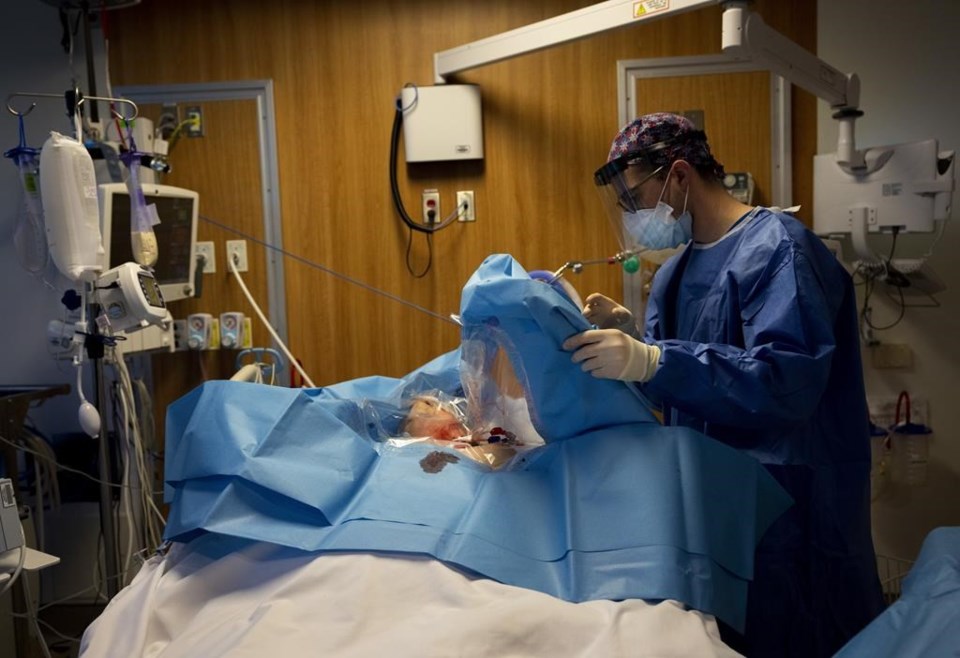TORONTO — Ontario is set to make sweeping changes to its health-care model by performing thousands of publicly funded surgeries in private clinics, but some medical professionals say it's unclear who will staff them without ravaging the already beleaguered hospital system.
Senior government sources -- who were not authorized to speak ahead of an announcement set for next week --said the province will turn to for-profit private clinics to perform cataract, knee and hip replacements in a bid to stem the province's surgical backlog.
The first phase of the surgical reform will focus on expansion of cataract surgeries, the sources said, through boosting existing independent health facilities' capacities.
A second phase will expand into low complex orthopedic surgeries like knee and hip replacements as well as diagnostic tests and could see procedures done in either new or existing facilities, they said.
The sources said the changes won't take doctors and nurses out of the hospital system and that the private clinics will have to provide staffing plans to ensure it is not negatively affected.
But medical officials said Friday it's unclear where the surgeons, nurses and other health-care workers needed to run them would come from.
Dr. Michael Warner, director of the ICU at Michael Garron Hospital in Toronto, said new physical centres for surgeries aren't necessary given the vast majority of operating rooms across the province are available on evenings and weekends.
"That's not because of limited demand, that's because of the inability to staff those rooms," he said.
"The surgeons and nurses have to come from somewhere. I'm not sure why we would create new facilities and then, in theory, pull staff out of the public hospital system to provide those services to patients in a private facility when we have the operating rooms, the recovery spaces already in existence."
The registrar of the College of Physicians and Surgeons of Ontario, the province's regulatory body for doctors, said it told the government many months ago that stand-alone surgical centres needed to be connected to the hospital system to "ensure continuity of care and patient safety."
"We also shared that this wasn’t the solution to the health care crisis and would further tax our health human resources shortages and further increase wait times for more urgent hospital-based care," Dr. Nancy Whitmore said in a statement Friday.
"We have not recently been engaged in the conversation and were not informed that this was being announced or implemented."
On Wednesday, Premier Doug Ford hinted at the move, saying the province needs independent health facilities to address the growing surgical backlog and assured patients they will not have to pay out of pocket for them.
Ford said it would be "simple stuff, not complicated: knee replacements, hip replacements, cataracts."
"These are no-brainers that are backlogging the health-care system," he said.
The sources said the government will also introduce a centralized wait-list system in order to make the new surgical system more efficient.
Health Minister Sylvia Jones announced last summer the government's intention to perform some surgeries outside of the hospital system.
In November, Ontario Health's chief medical director Dr. Chris Simpson said the provincewide surgical backlog stood at 250,000 surgeries.
It's a similar number to before the pandemic, he said, but people are now waiting longer to get those surgeries – about 45 per cent are waiting longer than the clinically determined benchmark.
The Ontario Nurses' Association called the new plan "disastrous" and called on the province to invest in the public system.
"There is just one pool of nurses and health-care professionals in Ontario and it’s been dramatically drained due to the policies of the Ford government and burnout among workers," said Bernie Robinson, the association's president, in a statement.
"The highly educated and specialized nurses and health-care professionals who are qualified to safely work in surgical settings need more support and better funding in the public system, not a plan that will simply divert public dollars into the hands of private shareholders."
The Ontario Medical Association met with Jones in early November to pitch the province on a similar idea of getting simpler surgeries performed out of hospitals and performed at specialized centres.
"I feel as though the government is listening and we have had an opportunity to positively influence with what we as physicians believe is needed," said Dr. Rose Zacharias, the association's president.
But their model proposed non-profit centres that were integrated with the health-care system by being affiliated with a hospital, which Zacharias said would make it easier to reorganize staff.
"Such centres as we have recommended would be extremely effective in catching up on the surgical backlog," Zacharias said.
She reserved judgment until the government provides all the details, but said any new system needs a detailed plan to staff it and not contribute to the "human health resource crisis."
Warner, the ICU doctor, also cautioned about the upselling that occurs in some independent health facilities such as the ones that provide cataract surgeries.
"In cataract surgery, you can get the OHIP lens for free," he said.
"Some patients are offered different lenses for different reasons, and there's no market control over how much the patient can be charged for that lens."
He said patients aren't in a position to negotiate with a doctor or clinic because they are not surgeons and do not know enough about the various options available.
"I don't think that doctors or clinics should be making margin on different hardware if the surgical technique for inserting that hardware and doing the procedure is the same as the OHIP-funded procedure," he said.
This report by The Canadian Press was first published Jan. 13, 2023.
Liam Casey, The Canadian Press

